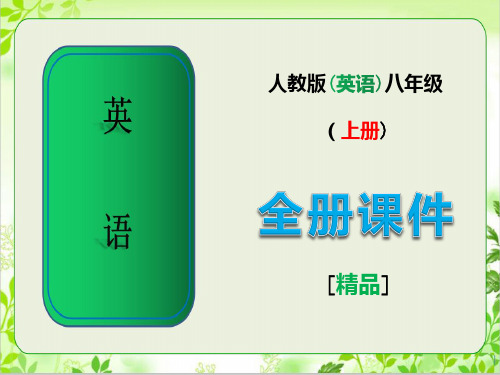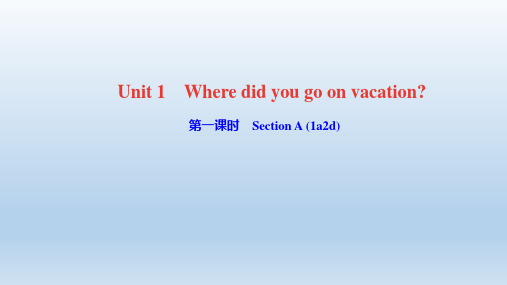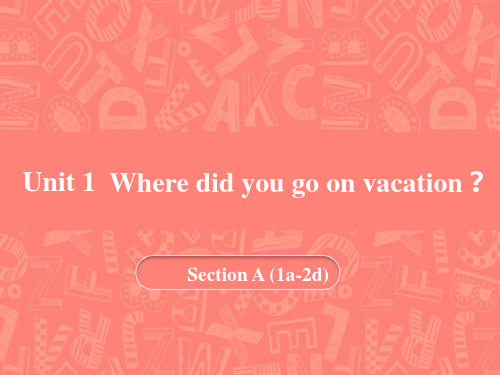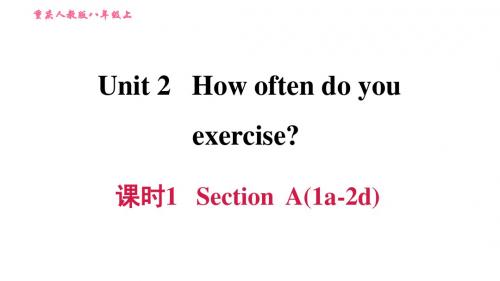人教版八年级英语上册Unit1 Section A(1a-2d)课件
合集下载
2020秋人教版八年级上册英语全册完整课件

A: Where did … go on vacation? B: ...
went to the beach
A: Where did … go on vacation? B: ...
stayed at home
2a Listen. Where did the people go on vacation? Complete the chart.
anyone 任何人 each 每个
个
anything 任何 事物
no 无 nobody 无人
every 每个
nothing 无物 all 全体;全部 both 两个(都) none 没人或物 (指两个以上)
other(s) 另一个 (些) another 另外一 个;又一个 much 很多
many 很多
neither 没人或物
(指两个当中)
anybody 任 few 一些;几
Where did you go on vacation?
visited museums
Where did you go on vacation?
went to summer camp
1a Match the activities with the pictures [a-g].
Where did you go
do anything
✔
Julie interesting?
study for tests? ✔
go out with anyone?
✔
Talk about your vacation plans with your friends and fill in the chart.
Name Vacation plans Who? When?
人教版八年级上册Unit1知识点复习课件(共43张PPT)

SectionB
enjoyable adj. 有乐趣的 <2a>
Eg. Swimming is one of the most enjoyable
activities. enjoy+n./代/Ving v.喜欢/享受 enjoy oneself 玩的开心 enjoy my weekend 享受我的周末 enjoy learning English 享受(喜欢)学习英语 常接Ving作宾语的动词/动词短语:
visitor n. 游客
3. Grammar Focus 复合不定代词
1. 作主语时 谓语动词用单数
Eg.Everyone is happy. 2.被定语修饰时(形容词/动词不定式/else 等) 定语后置.
Eg.I like nothing old, but friends.
Eg.Would you like something else? 3.some类用在肯定句,any类用在否定句/ 疑问句在表示请求/提议等希望得到对方 肯定答复的问句中用some不用any
Eg. He has good taste in clothes.
look feel sound smell taste
anything
anyone
everything
something
anything anything
nothing
11. of course "当然" <3a> =sure/certainly of course not-当然不 Eg. --- Would you mind closing the window?
Eg. They were on vacation last
人教版八年级英语上册《 Unit 1 Where did you go on vacation Period 1 Section A(1a-2d)》PPT课件

museum
stayed at home
Where did she go on vacation ?
She stayed at home.
went to New York City
Where did he go on vacation?
He went to New York City.
Uncle
family. Rick: Wow! Did you see Huangguoshu
Waterfall? Helen: Yes, I did. It was wonderful. We 相当多 took quite a few photos there. 一些特殊的W事hat about you? Did you do
vacation.
2c Group work:Role play conversations between Nancy.
Kevin, Julie. You can talk about the activities in the chart and other activities.
A: Nancy, Where did you go on vacation? B: I went to New York City. A: Oh, really? Did you go with anyone? B: Yes, I did.
Unit 1 Where did you go on vacation ?
Revision
How was your weekend ? It was great / OK /
not bad / not very good …
What did you do last weekend ?
人教版八年级上册英语全册课件-八上英语课件

do anything
✔
Julie interesting?
study for tests? ✔
go out with anyone?
✔
Talk about your vacation plans with your friends and fill in the chart.
Name Vacation plans Who? When?
Where did you go on vacation?I went to
the
2mountai 1 ns.
4
53
1. Tina 2. Xiang Hua
3. Sally
4. Bob
5. Tom
1c
A: What did Tina go on vacation? B: She went to the mountains.
stayed at home
Where did you go on vacation?
went to New York City
Where did you go on vacation?
went to the beach
Where did you go on vacation?
visited my uncle
People
Places
Grace New York City (Central Park) Kevin the beach Julie stayed at home
2b Listen again. Check (✔) Yes, I did or No, I didn’t for each question.
anyone 任何人 each 每个
初中英语八年级上册 全册Unit 1-10 课件 人教新目标版(付,1094)

( B)12.________ swept the floor yesterday.It is so clean.
A.Everyone B.Someone C.Anyone D.No one
C
( )13.—How was your vacation?
—________! I had a wonderful time there.
A.sounds B.seems
C.feels
D.smells
( C )15.The stories are very ________. And I'm ________ with them.
A.boring; boring B.bored; bored C.boring; bored D.bored; boring
二、根据句意,用所给词的适当形式填空。
6.—Are
there
anything __________(something)
interesting
in
this
shop?
—Yes. You can go and choose(选择) some gifts for your friends.
7.I saw many ____p_h_o_t_o_s(photo) on the wall of her bedroom.
something
for
his
parents,but
nothing __________for himself.
3.Nowadays I can choose online courses and study by _______m_.yself
4.Yesterday,his neighbor's ______h_elanisd(下蛋) four eggs altogether.
A.Everyone B.Someone C.Anyone D.No one
C
( )13.—How was your vacation?
—________! I had a wonderful time there.
A.sounds B.seems
C.feels
D.smells
( C )15.The stories are very ________. And I'm ________ with them.
A.boring; boring B.bored; bored C.boring; bored D.bored; boring
二、根据句意,用所给词的适当形式填空。
6.—Are
there
anything __________(something)
interesting
in
this
shop?
—Yes. You can go and choose(选择) some gifts for your friends.
7.I saw many ____p_h_o_t_o_s(photo) on the wall of her bedroom.
something
for
his
parents,but
nothing __________for himself.
3.Nowadays I can choose online courses and study by _______m_.yself
4.Yesterday,his neighbor's ______h_elanisd(下蛋) four eggs altogether.
人教版八年级英语上册 Unit 1 Section A (1a-2d) 课件

如果有谁能干这事,我也能。
Anyone can come here to attend the party. 任何人都可以来这儿参加宴会。
考向二 形容词修饰anyone, someone, anything, something等不定代词时,形容词要后置。 eg:Did you see anyone interesting? 你见过有趣的人吗?
Conversation 3 Boy: Where did you go on your vacation, Julie? Julie: I stayed at home. Boy: Oh. So, did you do anything interesting? Julie: No, I didn’t. Boy: Did you study for your tests? Julie: Yes, I did. Boy: Did you go out with anyone? Julie: No. No one was here. Everyone was on vacation.
1b
Listen and number the people in the picture[1-5].
1.Tina 2.Xiang Hua 3.Sally 4.Bob 5.Tom
Байду номын сангаас
2 4
53
1b
Conversation 1
Xiang Hua: Hey, Tina. Where did you go on vacation? Tina: I went to the mountains with my family.
Xiang Hua: Did everyone have a good time? Tina: Oh, yes. Everything was excellent. Where did you go, Xiang Hua?
Anyone can come here to attend the party. 任何人都可以来这儿参加宴会。
考向二 形容词修饰anyone, someone, anything, something等不定代词时,形容词要后置。 eg:Did you see anyone interesting? 你见过有趣的人吗?
Conversation 3 Boy: Where did you go on your vacation, Julie? Julie: I stayed at home. Boy: Oh. So, did you do anything interesting? Julie: No, I didn’t. Boy: Did you study for your tests? Julie: Yes, I did. Boy: Did you go out with anyone? Julie: No. No one was here. Everyone was on vacation.
1b
Listen and number the people in the picture[1-5].
1.Tina 2.Xiang Hua 3.Sally 4.Bob 5.Tom
Байду номын сангаас
2 4
53
1b
Conversation 1
Xiang Hua: Hey, Tina. Where did you go on vacation? Tina: I went to the mountains with my family.
Xiang Hua: Did everyone have a good time? Tina: Oh, yes. Everything was excellent. Where did you go, Xiang Hua?
人教版初中英语八年级上册Unit 1 Section A 1a—2d,(共16张PPT)

1
2
3
4
5
Writing If you are Li Hua , introduce your friends and your vacation in the chart.
Exercise: I.写出下列短语: 1.呆在家___________2.去纽约市__________ 3.去海滩___________4.去夏令营___________ 5.去爬山___________6.拜访我的叔叔_______ 7.参观博物馆________ II.用所给单词的适当形式填空:
13、He who seize the right moment, is the right man.谁把握机遇,谁就心想事成。21.8.2421.8.2422:49:0322:49:03August 24, 2021
•
14、谁要是自己还没有发展培养和教育好,他就不能发展培养和教育别人。2021年8月24日星期二下午10时49分3秒22:49:0321.8.24
•
11、只有让学生不把全部时间都用在学习上,而留下许多自由支配的时间,他才能顺利地学习……(这)是教育过程的逻辑。21.8.2422:49:0322:49Aug-2124-Aug-21
•
12、要记住,你不仅是教课的教师,也是学生的教育者,生活的导师和道德的引路人。22:49:0322:49:0322:49Tuesday, August 24, 2021
A: Where did you go on vacation? B: I visited my uncle. C: I went to the beach. D: ... E: ...
A game: Choose a number and use the picture under it to ask and anwer.
人教版八年级上册英语(重庆专版)习题课件:Unit 2 课时1 Section A (1a-2d)(共19张PPT)

A. How do you usually get there? B. Sorry, I can’t. C. How is the weather? D. How long does the train ride take? E. How far is it from your grandpa’s
home? F. How often do you visit your grandpa? G. What do you usually do with your
his farm.
F. How often do you visit your grandpa? G. What do you usually do with your
grandpa?
12. 萨莉, 你常帮忙做家务吗? Sally, do you often___h_e_l_p__ ___w__it_h__the housework?
13. 我这周相当忙,我想去学摇摆舞。 This week is quite ___f_u_ll___ ____f_o_r__me. I want to learn __s_w_i_n_g__ __d_a_n_c_e__.
grandpa?
A. How do you usually get there? A: Is your grandpa’s home B. Sorry, I can’t.
far from yours?
C. How i about 150 kilometers.
A. I agree.
B. How come?
C. That’s for sure.
D. Not much.
【点拨】How come? 意为“怎么会?”;
- 1、下载文档前请自行甄别文档内容的完整性,平台不提供额外的编辑、内容补充、找答案等附加服务。
- 2、"仅部分预览"的文档,不可在线预览部分如存在完整性等问题,可反馈申请退款(可完整预览的文档不适用该条件!)。
- 3、如文档侵犯您的权益,请联系客服反馈,我们会尽快为您处理(人工客服工作时间:9:00-18:30)。
There are quite a few birds in the forest. 在那片森林里有大量的鸟。
4. I just stayed at home most of the time to read and relax. most意为“大多数”,后跟可数名词或不 可数名词均可。例如:
Most students go to school on foot. 大多数学生步行去上学。
What did you do in your summer vacation?
I went to Beijing
for vacation.
I went summer camp.
I went to the mountains.
I stayed at home. I went to the beach. I visited the museums.
Julie, where did
I ...
you go on vacation?
Oh, really? Did you go with anyone?
Yes, I ...
2d Read the conversation and match the people with the right place.
Rick
Helen
Role-play the conversation.
Rick: Hi, Helen. Long time no see. Helen: Hi, Rick. Yes, I was on vacation last
month. Rick: Oh, did you go anywhere interesting? Helen: Yes, I went to Guizhou with my
1. Did he go out with _a_n_y_o_n_e___ (任何人)? 2. They didn’t buya_n_y_t_h_i_n_g _s_p_e_c_ia_l_ (特殊的
东西) there yesterday. 3. Tell us _s_o_m__e_th__in_g_ _in_t_e_r_e_st_i_n_g_ (有趣的事
Do anything interesting?
Julie Study for tests? √
Go out with anyone?
No, I didn’t
√
√
2c Role-play the conversations between Grace, Kevin and Julie.
A: Grace, where did you go on vacation?
family. Rick: Wow! Did you see Huangguoshu
Waterfall?
Helen: Yes, I did. It was wonderful! We took quite a few photos there. What about you? Did you do anything special last month?
4 2
5 3
1c
Make conversations about the people in 1a.
Where did Tina go on vacation?
She went to the mountains.
Where did … go on vacation?
She/He …
Make your own
Did you…
Yes, I did.
go with anyone?
√
go to central Grace Park?
√
Buy anything special?
√
Play volleyball?
Kevin Swim?
√
Meet anyone
√
interesting?
No, I didn’t
√
Did you… Yes, I did.
Complete the chart.
People Grace Kevin Julie
Places New York City The beach Stayed at home
2b Listen again. Check (√) Yes, I did or No, I didn’t for each question.
3. We took quite a few photos there. a few 意为“一些,若干(=some)”,后 跟可数名词复数形式。 quite a few 意为“相当多;不少(=many)” 后跟可数名词复数形式。 例如:
A few girls are playing volleyball. 几名女孩正在打排球。
B: I went to New York City. A: Oh, really? Did you go with anyone? B: Yes, I went with my mother.
Kevin, where did
you go on
I ...
vacation?
Oh, really? Did you go Yes, I ... with anyone?
情) about your vacation, Jenny.
4. They caught _q__u_it_e__ _a__ __fe_w__ (相当多的) insects in the forest.
5. _M__o_s_t _o_f t_h_e_ (大多数) students can get to school early.
mountains _c_
6. went to the beach _a_
7. visited museums _e__
1b Listen and number the
people in the picture (1-5).
1. Tina 2. Bob 3. Sally 4. Xiang Hua 5. Tom
conversations.
How was your vacation?
Great!
Where did you go?
I went to the mountains.
I went to the Great Wall.
Where did you go?
Listen. Where did the
2a people go on vacation?
1a Match the pictures with the activities [a-g].
1. stayed at home _f_ 2. went to New York
City _b_ 3. visited my uncle _g_
4. went to summer
camp _d_
5. went to the
【辨析】 most + 名词 泛指多数,无范围; most + of + the (this/that/those/these等)名
词 ,指某一范围内的多数。 例如:
Most of the udents go to school by bike. 这些学生们中的多数骑自行车去上学。
根据汉语提示完成句子。
用英语询问你的一位好朋友,她(他) 假期去了哪里?看到了什么?并将此对 话写在作业上。 A: Where did you go, …? B: I went to… A: Did you see… B: Yes, I did. / No, I didn’t.
There’s nothing interesting in the news today.
2. Did you go anywhere interesting? anywhere意为“在任何地方”,常用于一 般疑问句或否定句中,代替somewhere。例 如:
I can’t find my keys anywhere. 我到处找不到我的钥匙。
Rick: Not really. I just stayed at home most of the time to read and relax.
1. Did you buy anything special? 在英语中,anything, something, nothing和 everything是用于指代事物的复合不定代词,与 之相对应的复合不定代词anyone, someone, no one 和everyone (anybody, somebody, nobody和 everybody) 用于指人。与形容词连用时,形容词 必须置于复合不定词之后,语法上称作“后置”。 例如:I can see someone new in your group.
4. I just stayed at home most of the time to read and relax. most意为“大多数”,后跟可数名词或不 可数名词均可。例如:
Most students go to school on foot. 大多数学生步行去上学。
What did you do in your summer vacation?
I went to Beijing
for vacation.
I went summer camp.
I went to the mountains.
I stayed at home. I went to the beach. I visited the museums.
Julie, where did
I ...
you go on vacation?
Oh, really? Did you go with anyone?
Yes, I ...
2d Read the conversation and match the people with the right place.
Rick
Helen
Role-play the conversation.
Rick: Hi, Helen. Long time no see. Helen: Hi, Rick. Yes, I was on vacation last
month. Rick: Oh, did you go anywhere interesting? Helen: Yes, I went to Guizhou with my
1. Did he go out with _a_n_y_o_n_e___ (任何人)? 2. They didn’t buya_n_y_t_h_i_n_g _s_p_e_c_ia_l_ (特殊的
东西) there yesterday. 3. Tell us _s_o_m__e_th__in_g_ _in_t_e_r_e_st_i_n_g_ (有趣的事
Do anything interesting?
Julie Study for tests? √
Go out with anyone?
No, I didn’t
√
√
2c Role-play the conversations between Grace, Kevin and Julie.
A: Grace, where did you go on vacation?
family. Rick: Wow! Did you see Huangguoshu
Waterfall?
Helen: Yes, I did. It was wonderful! We took quite a few photos there. What about you? Did you do anything special last month?
4 2
5 3
1c
Make conversations about the people in 1a.
Where did Tina go on vacation?
She went to the mountains.
Where did … go on vacation?
She/He …
Make your own
Did you…
Yes, I did.
go with anyone?
√
go to central Grace Park?
√
Buy anything special?
√
Play volleyball?
Kevin Swim?
√
Meet anyone
√
interesting?
No, I didn’t
√
Did you… Yes, I did.
Complete the chart.
People Grace Kevin Julie
Places New York City The beach Stayed at home
2b Listen again. Check (√) Yes, I did or No, I didn’t for each question.
3. We took quite a few photos there. a few 意为“一些,若干(=some)”,后 跟可数名词复数形式。 quite a few 意为“相当多;不少(=many)” 后跟可数名词复数形式。 例如:
A few girls are playing volleyball. 几名女孩正在打排球。
B: I went to New York City. A: Oh, really? Did you go with anyone? B: Yes, I went with my mother.
Kevin, where did
you go on
I ...
vacation?
Oh, really? Did you go Yes, I ... with anyone?
情) about your vacation, Jenny.
4. They caught _q__u_it_e__ _a__ __fe_w__ (相当多的) insects in the forest.
5. _M__o_s_t _o_f t_h_e_ (大多数) students can get to school early.
mountains _c_
6. went to the beach _a_
7. visited museums _e__
1b Listen and number the
people in the picture (1-5).
1. Tina 2. Bob 3. Sally 4. Xiang Hua 5. Tom
conversations.
How was your vacation?
Great!
Where did you go?
I went to the mountains.
I went to the Great Wall.
Where did you go?
Listen. Where did the
2a people go on vacation?
1a Match the pictures with the activities [a-g].
1. stayed at home _f_ 2. went to New York
City _b_ 3. visited my uncle _g_
4. went to summer
camp _d_
5. went to the
【辨析】 most + 名词 泛指多数,无范围; most + of + the (this/that/those/these等)名
词 ,指某一范围内的多数。 例如:
Most of the udents go to school by bike. 这些学生们中的多数骑自行车去上学。
根据汉语提示完成句子。
用英语询问你的一位好朋友,她(他) 假期去了哪里?看到了什么?并将此对 话写在作业上。 A: Where did you go, …? B: I went to… A: Did you see… B: Yes, I did. / No, I didn’t.
There’s nothing interesting in the news today.
2. Did you go anywhere interesting? anywhere意为“在任何地方”,常用于一 般疑问句或否定句中,代替somewhere。例 如:
I can’t find my keys anywhere. 我到处找不到我的钥匙。
Rick: Not really. I just stayed at home most of the time to read and relax.
1. Did you buy anything special? 在英语中,anything, something, nothing和 everything是用于指代事物的复合不定代词,与 之相对应的复合不定代词anyone, someone, no one 和everyone (anybody, somebody, nobody和 everybody) 用于指人。与形容词连用时,形容词 必须置于复合不定词之后,语法上称作“后置”。 例如:I can see someone new in your group.
